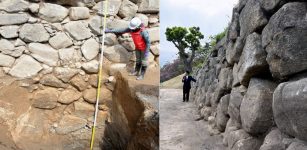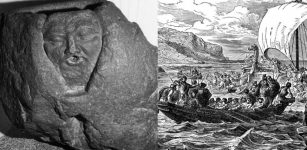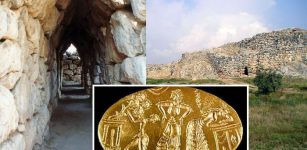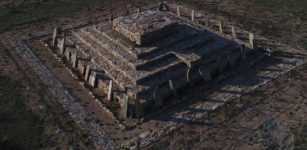Supernatural Beliefs Have Featured In Every Society Throughout History: New Research Helps Explain Why
AncientPages.com - Religion is a human universal. For thousands of years, humans have held religious beliefs and participated in religious rituals. Throughout history, every human society has featured some kind of supernatural or religious belief.
The story of Cain slaying Abel purports to explain the origin of murder. Wikimedia
Why is religion so prevalent? One reason is that it's a powerful tool for explanation.
The world is a mysterious place, and was even more mysterious before the rise of modern science. Religion can be a way of making sense of this mystery. This idea dates back to theologians and philosophers such as Henry Drummond and Friedrich Nietzsche, who both supported the "God of the gaps" hypothesis, wherein divine intervention by God is used to explain gaps in scientific knowledge.
For example, ancient Chinese and Korean societies looked to divine intervention to justify changing their rulers, whereas Egyptians, Aztecs, Celtic, and Tiv people used the will of gods to explain celestial cycles.
In the contemporary world, many US Christians viewed the COVID pandemic as a form of divine punishment.
Yet despite these specific examples, we know little about which kinds of phenomena people try to explain using religion. If religion helps us fill gaps in knowledge, what kind of gaps is it most likely to fill?
Our international research team has pursued this question over the past five years, by surveying ethnographies from societies around the world and throughout history.
We found societies are overwhelmingly more likely to have supernatural beliefs that concern "natural" phenomena, rather than "social" phenomena. Our study is available online and published in Nature Human Behaviour.
Supernatural explanations for natural events
In total, our research sample included historical records from 114 diverse societies.
These ranged from nomadic hunter-gatherer groups in Africa (such as the !Kung people), to fishing and horticultural societies from the Pacific Islands (such as people from the Trobriand Islands), to large "complex" societies with modern technology and written records (such as the Javanese, Malay and Turkish societies).
For each society, we read through ethnographic texts and identified supernatural explanations that were commonly held across its people. We then identified the source of the explanation.
We were particularly interested in whether supernatural explanations focused on "natural" phenomena—events that had no clear human cause such as disease, natural disasters and drought—or whether they focused on human-caused "social" phenomena such as wars, murder and theft.
We found explanations for all these various phenomena in our survey. For example, the Cayapa people of the Ecuadorian rainforest attributed lightning, a natural phenomenon, to the Thunder spirit, who carried a large sword that glinted when he used it in combat.
And the Comanche people of the great American plains explained the timing of war, a social phenomenon, using dreams from medicine men.
However, our results also revealed a striking gap: supernatural explanations for natural phenomena were much more prevalent than for social phenomena.
In fact, nearly all the societies we surveyed had supernatural explanations for natural phenomena such as disease (96%), natural disasters (92%) and drought (90%). Fewer had supernatural explanations for warfare (67%), murder (82%) and theft (26%).
Supernatural beliefs evolve as societies expand
The global prevalence of naturally focused supernatural explanations is one of the most striking findings from our research. It's partly surprising because current major religions such as Christianity and Islam are very social institutions.
Contemporary Christians rely on their religious beliefs as more of a social and moral compass, rather than a way to understand the weather. Similarly, the Bible seeks to explain a variety of social phenomena. The story of Cain and Abel explains the origin of murder, while the Book of Joshua explains the supernatural causes of the war that destroyed Jericho.
So how might we explain the contrast between supernatural explanations in modern-day Christianity, and supernatural explanations among traditional societies, as told through historical records? One of our findings could provide a clue.
We found societies develop more supernatural explanations for social phenomena as they get bigger and more complex. More populous societies with currency and land transport were more likely to explain events such as theft and warfare using supernatural principles than small hunter-gatherer and horticultural groups.
We can't say with certainty why this is. It may be because people know and trust each other less in bigger societies, and this translates to beliefs in witchcraft and sorcery. Or perhaps people in larger complex societies are more concerned about issues such as warfare and theft, and therefore more likely to develop supernatural explanations for them.
Intellectuals such as Edward Tylor and David Hume thought religious beliefs may have originated as a means of explaining natural phenomena.
Although our study can't shed light on the origins of religion, it does corroborate this idea. But beyond that, it also shows that societies are more likely to turn to religion to make sense of the social world as they get larger and more complex.
Written by Joshua Conrad Jackson and Brock Bastian, The Conversation
Provided by The Conversation
This article is republished from The Conversation under a Creative Commons license. Read the original article.
More From Ancient Pages
-
 Excavations At Okazaki Castle Reveal A 400-Year-Old Massive Unbroken Wall
Archaeology | Apr 16, 2016
Excavations At Okazaki Castle Reveal A 400-Year-Old Massive Unbroken Wall
Archaeology | Apr 16, 2016 -
 Why Coyote Wanted People To Die For Their Own Good – A Caddo Nation Legend
Featured Stories | Jun 18, 2021
Why Coyote Wanted People To Die For Their Own Good – A Caddo Nation Legend
Featured Stories | Jun 18, 2021 -
 23,000-Year-Old Footprints Are Earliest Evidence Of Human Activity Found In The Americas
Archaeology | Sep 23, 2021
23,000-Year-Old Footprints Are Earliest Evidence Of Human Activity Found In The Americas
Archaeology | Sep 23, 2021 -
 Melipona Beecheii – Sacred Ancient Maya Beekeeping Site Discovered In Quintana Roo, Mexico
Archaeology | May 28, 2024
Melipona Beecheii – Sacred Ancient Maya Beekeeping Site Discovered In Quintana Roo, Mexico
Archaeology | May 28, 2024 -
 Brian Boru – Famous And Brave Irish Hero Who Dared To Chase Off The Vikings
Featured Stories | Jun 14, 2022
Brian Boru – Famous And Brave Irish Hero Who Dared To Chase Off The Vikings
Featured Stories | Jun 14, 2022 -
 65,000-Year-Old ‘Stone Swiss Army Knives’ Show Early Humans Had Long-Distance Social Networks
Archaeology | Oct 22, 2022
65,000-Year-Old ‘Stone Swiss Army Knives’ Show Early Humans Had Long-Distance Social Networks
Archaeology | Oct 22, 2022 -
 Ancient Mysteries Of Chicago: Is The Puzzling Waubansee Stone A Neglected Pre-Columbian Artifact?
Artifacts | Mar 4, 2017
Ancient Mysteries Of Chicago: Is The Puzzling Waubansee Stone A Neglected Pre-Columbian Artifact?
Artifacts | Mar 4, 2017 -
 Mysterious 11,000 – Year-Old Tower Of Jericho: Was World’s First Skycraper A Symbol Of Power Or An Ancient Time-Keeping Device?
Civilizations | Aug 11, 2021
Mysterious 11,000 – Year-Old Tower Of Jericho: Was World’s First Skycraper A Symbol Of Power Or An Ancient Time-Keeping Device?
Civilizations | Aug 11, 2021 -
 Hot-Tempered Shield Maiden Freydis Eiriksdottir’s Unusual Adventures In Vinland And Greenland – Trouble Followed in Her Footsteps
Featured Stories | Apr 3, 2025
Hot-Tempered Shield Maiden Freydis Eiriksdottir’s Unusual Adventures In Vinland And Greenland – Trouble Followed in Her Footsteps
Featured Stories | Apr 3, 2025 -
 Ancient Mystery Of The Tomb Of Tiryns – Burial Place For An Unknown Mycenaean Hero?
Featured Stories | Jan 11, 2021
Ancient Mystery Of The Tomb Of Tiryns – Burial Place For An Unknown Mycenaean Hero?
Featured Stories | Jan 11, 2021 -
 Ancient Roman Coffin Found In Leeds Revealed To The Public For The First Time
Archaeology | Apr 22, 2024
Ancient Roman Coffin Found In Leeds Revealed To The Public For The First Time
Archaeology | Apr 22, 2024 -
 Unique Discovery – 2,000-Year-Old Roman Coins Found On Gotska Sandön In Sweden
Archaeology | Apr 13, 2023
Unique Discovery – 2,000-Year-Old Roman Coins Found On Gotska Sandön In Sweden
Archaeology | Apr 13, 2023 -
 Mystery Of The Lost Arctic Civilization- Two Ancient Mummies Found At The Zeleny Yar Necropolis
Archaeology | Jul 20, 2017
Mystery Of The Lost Arctic Civilization- Two Ancient Mummies Found At The Zeleny Yar Necropolis
Archaeology | Jul 20, 2017 -
 Intriguing 3,400-Year-Old Multipurpose Pyramid Found In Kazakhstan
Archaeology | Nov 2, 2023
Intriguing 3,400-Year-Old Multipurpose Pyramid Found In Kazakhstan
Archaeology | Nov 2, 2023 -
 Eye Of Providence – Powerful, Secret Symbol With Deep Meaning
Ancient Symbols | Feb 13, 2018
Eye Of Providence – Powerful, Secret Symbol With Deep Meaning
Ancient Symbols | Feb 13, 2018 -
 Sacsayhuamán – Was It Built By ‘Demons’ Or Viracocha The Bearded God?
Ancient Mysteries | Apr 10, 2014
Sacsayhuamán – Was It Built By ‘Demons’ Or Viracocha The Bearded God?
Ancient Mysteries | Apr 10, 2014 -
 Bible And Book Of Enoch Reveal Why Ancient Giant Bones Are Missing
Ancient Mysteries | Jul 21, 2018
Bible And Book Of Enoch Reveal Why Ancient Giant Bones Are Missing
Ancient Mysteries | Jul 21, 2018 -
 Sightings Of Mysterious Walking Children And Ominous Beings In California’s Cursed Forest
Featured Stories | Oct 15, 2024
Sightings Of Mysterious Walking Children And Ominous Beings In California’s Cursed Forest
Featured Stories | Oct 15, 2024 -
 Empusa – Shape-Shifting Evil Female Demon In Greek Myth And Folklore
Featured Stories | Jun 3, 2020
Empusa – Shape-Shifting Evil Female Demon In Greek Myth And Folklore
Featured Stories | Jun 3, 2020 -
 Strange Flat Idol Sculpture From Bactria Remains Unexplained
Artifacts | Sep 26, 2019
Strange Flat Idol Sculpture From Bactria Remains Unexplained
Artifacts | Sep 26, 2019

